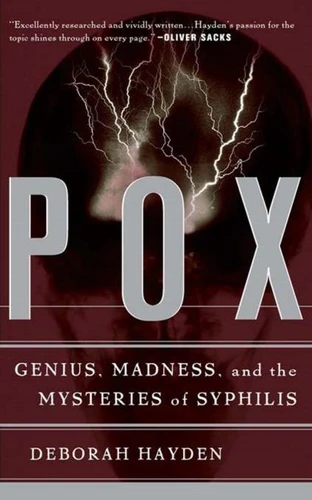Pox. Genius, Madness, And The Mysteries Of Syphilis
Par :Formats :
Disponible dans votre compte client Decitre ou Furet du Nord dès validation de votre commande. Le format ePub protégé est :
- Compatible avec une lecture sur My Vivlio (smartphone, tablette, ordinateur)
- Compatible avec une lecture sur liseuses Vivlio
- Pour les liseuses autres que Vivlio, vous devez utiliser le logiciel Adobe Digital Edition. Non compatible avec la lecture sur les liseuses Kindle, Remarkable et Sony
- Non compatible avec un achat hors France métropolitaine
 , qui est-ce ?
, qui est-ce ?Notre partenaire de plateforme de lecture numérique où vous retrouverez l'ensemble de vos ebooks gratuitement
Pour en savoir plus sur nos ebooks, consultez notre aide en ligne ici
- Nombre de pages352
- FormatePub
- ISBN978-0-7867-2413-0
- EAN9780786724130
- Date de parution03/08/2008
- Protection num.Adobe DRM
- Infos supplémentairesepub
- ÉditeurBasic Books
Résumé
Was Beethoven experiencing syphilitic euphoria when he composed "Ode to Joy"? Did van Gogh paint "Crows Over the Wheatfield" in a fit of diseased madness right before he shot himself? Was syphilis a stowaway on Columbus's return voyage to Europe? The answers to these provocative questions are likely "yes, " claims Deborah Hayden in this riveting investigation of the effects of the "Pox" on the lives and works of world figures from the fifteenth through the twentieth centuries.
Writing with remarkable insight and narrative flair, Hayden argues that biographers and historians have vastly underestimated the influence of what Thomas Mann called "this exhilarating yet wasting disease." Shrouded in secrecy, syphilis was accompanied by wild euphoria and suicidal depression, megalomania and paranoia, profoundly affecting sufferers' worldview, their sexual behavior and personality, and, of course, their art.
Deeply informed and courageously argued, Pox has already been heralded as a major contribution to our understanding of genius, madness, and creativity.
Writing with remarkable insight and narrative flair, Hayden argues that biographers and historians have vastly underestimated the influence of what Thomas Mann called "this exhilarating yet wasting disease." Shrouded in secrecy, syphilis was accompanied by wild euphoria and suicidal depression, megalomania and paranoia, profoundly affecting sufferers' worldview, their sexual behavior and personality, and, of course, their art.
Deeply informed and courageously argued, Pox has already been heralded as a major contribution to our understanding of genius, madness, and creativity.
Was Beethoven experiencing syphilitic euphoria when he composed "Ode to Joy"? Did van Gogh paint "Crows Over the Wheatfield" in a fit of diseased madness right before he shot himself? Was syphilis a stowaway on Columbus's return voyage to Europe? The answers to these provocative questions are likely "yes, " claims Deborah Hayden in this riveting investigation of the effects of the "Pox" on the lives and works of world figures from the fifteenth through the twentieth centuries.
Writing with remarkable insight and narrative flair, Hayden argues that biographers and historians have vastly underestimated the influence of what Thomas Mann called "this exhilarating yet wasting disease." Shrouded in secrecy, syphilis was accompanied by wild euphoria and suicidal depression, megalomania and paranoia, profoundly affecting sufferers' worldview, their sexual behavior and personality, and, of course, their art.
Deeply informed and courageously argued, Pox has already been heralded as a major contribution to our understanding of genius, madness, and creativity.
Writing with remarkable insight and narrative flair, Hayden argues that biographers and historians have vastly underestimated the influence of what Thomas Mann called "this exhilarating yet wasting disease." Shrouded in secrecy, syphilis was accompanied by wild euphoria and suicidal depression, megalomania and paranoia, profoundly affecting sufferers' worldview, their sexual behavior and personality, and, of course, their art.
Deeply informed and courageously argued, Pox has already been heralded as a major contribution to our understanding of genius, madness, and creativity.



